Tag: Exploris School
40 Stories, 40 Years: Meredith and Mira Loughlin
March 20, 2023

MEREDITH AND MIRA LOUGHLIN, WASHINGTON
When Meredith and Neil Loughlin moved to Washington in 2009, they were looking for a slower pace and to make an investment in their future — theirs and downtown’s.
“Neil and I have always been drawn to the water. Neither one of grew up having a boat, but we find being on the water so peaceful, which is why we moved from Greensboro to Raleigh, then back toward the coast. I guess we were working our way back East,” Meredith said.
More than a decade later, their business, Lone Leaf Gallery and Custom Framing, is thriving; their family has grown by one with the addition of daughter Mira; and their passion for enjoying and protecting the waterways is now being passed down to the next generation.
The Loughlins’ involvement with Sound Rivers started with one of its signature events — the annual Oyster Roast — and a donation from Lone Leaf for the silent auction, usually oyster knives, crafted from railroad ties and made locally. As their familiarity with Sound Rivers grew, so did their appreciation for the work it does.
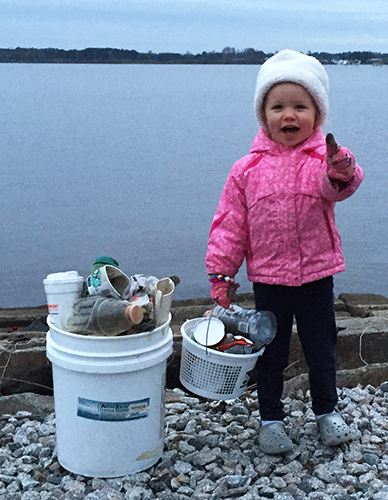
“I guess I started to realize just how important it was to have a Riverkeeper and someone whose primary focus is the health of the water,” Meredith said. “If Sound Rivers isn’t there doing that, whose job is it? I really love everything they do, from the stormwater mitigation to monitoring where pollution comes from. River basins are so complex, and the water comes from just everywhere. They use the data to inform the public of what effects our rivers, but also make rules for building practices and industry. They do so much to gather information so we can make wise decisions in our planning and in our developing.”
The Loughlins are now putting the science of Sound Rivers into personal practice. For the past two summers, Meredith and 8-year-old Mira have volunteered for Sound Rivers’ Swim Guide, collecting water samples for testing, the results of which are shared to let the public know where it’s safe to swim. This year, mother and daughter will be sampling for microplastics, helping with a two-year-long, statewide program in which Sound Rivers and 15 other Riverkeepers are taking part, and now, a new lesson in Mira’s education.
The Loughlins are now putting the science of Sound Rivers into personal practice. For the past two summers, Meredith and 8-year-old Mira have volunteered for Sound Rivers’ Swim Guide, collecting water samples for testing, the results of which are shared to let the public know where it’s safe to swim. This year, mother and daughter will be sampling for microplastics, helping with a two-year-long, statewide program in which Sound Rivers and 15 other Riverkeepers are taking part, and now, a new lesson in Mira’s education.
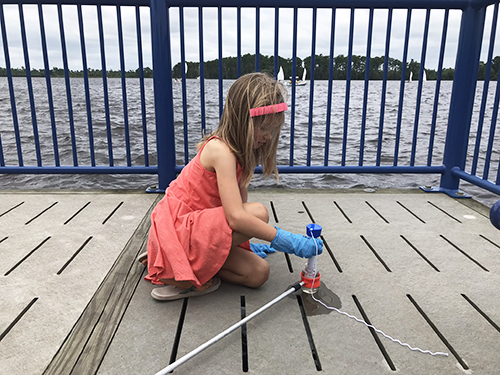
“Microplastics sampling — I thought it was really cool, because it’s like hands-on, citizen science. It shows her how to gather data in the field; how scientists gather data to form a bigger picture,” Meredith said. “I want to her see how it plays out in her local community. Science is really cool, but it always seems like it’s farfetched unless you see it applied in your community. … It’s great for her, just meeting the people who have these jobs like (Pamlico-Tar Riverkeeper Jill Howell) and the interns. She can see people who do this for a living, and maybe when she’s thinking about what she was wants to do for her career, she can think back to the people she’s met at Sound Rivers.”
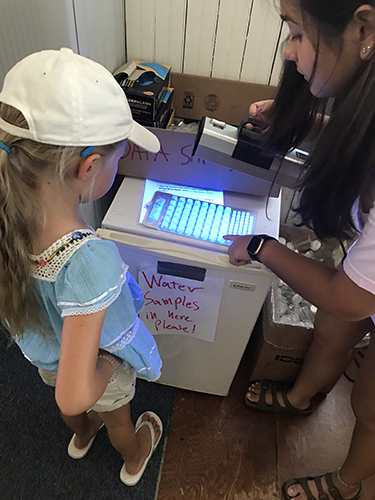
The Loughlins, as a family, are dedicated to promoting sustainability and protecting the waterways in all aspects of their lives.
“Whether I know I’m doing it or not, it’s just what we gravitate toward,” Meredith said. “It’s almost like a hobby: where art is my job, science and sustainability are my hobby.”
40 Stories, 40 years: Rick Dove
March 20, 2023
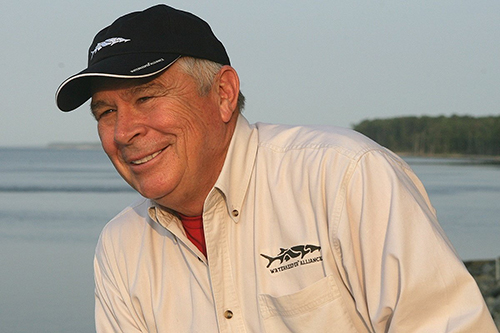
RICK DOVE, NEW BERN
“As a kid, I always wanted to be fisherman, but my mother and father talked me out of it,” said Rick Dove.
Dove got his chance, however, after earning a law degree, then getting a draft notice for Vietnam that resulted in a 20-plus-year career in the U.S. Marine Corps.
“I came here in 1975; the Marine Corps brought me here. When I walked out the gate for the last time, I traded my spit-shined shoes and put on the dirtiest clothes I could find and became a commercial fisherman,” Dove said. “Things were great until about 1990.”
That’s when the catch from the Neuse became riddled with sores; Dove and his son, Todd, who fished with him, had them too.
“I wouldn’t eat the fish, so I decided couldn’t sell them either,” Dove said.
Dove hung up his dirtiest clothes, went back to practicing law and found a new calling when he was hired as the Neuse Riverkeeper at the behest of early Neuse River Foundation board member Grace Evans. At that point, NRF had been successful in its bid for a statewide ban on cleaning products containing phosphorous, which entered the waterways through sewage treatment plants, much to the detriment of aquatic life, but NRF wanted to do more.
When Dove came aboard, he put his law degree to use again, this time going after those polluting the river, directly.
“We sued wastewater treatment plants and hog farms. Our docket had 20 cases on it, all the time. We were in court a good bit of the time, but most of our cases were settled out of court,” Dove said.
Neuse River Foundation grew from 70 members to more than 2,000. The Neuse River had gotten a bad reputation, devastating both tourism and the housing market, and disparate interests banded together to do something about it. Hundreds of volunteers patrolled and sampled the waters at stations from the lower Neuse up to Raleigh, and local pilots volunteered their planes to get a bird’s-eye view of pollution sources. A designated force of creek-keepers took an active role in tracking salinity, turbidity and oxygen levels in tributaries.
“It was a very active time in the ’90s. We got pretty good results with all the screaming and yelling we were doing about the health of the river,” Dove said.
Results included injunctions against industrial hog farms and EPA payouts to clean up rivers, as well as the creation of pollution-reducing rules by the state that were put in place for the Neuse River Basin in 1997.
But deep budgets cuts to North Carolina’s Department of Environmental Quality over the years, has meant watching over the waterways and doing much of the work necessary to keep rivers swimmable, fishable and drinkable has fallen to organizations such as Sound Rivers.
“If it’s going to get fixed, it’s going to be fixed by the waterkeepers. There’s nobody else out there doing the work. The rivers are screaming because they’re out of balance with nutrients, and when nature goes out of balance, it comes back with things like fish kills,” Dove said, referring to a month-long fish kill on the Neuse this fall that brought public concern to a level not seen in years. “I’d like to see us get back to what we used to do. We need to get tough again. Somehow, we need to get the message out to the public forum. We don’t have to be all negative, but we certainly have to speak for the river in ways that are honest or strong. You can’t compromise the river to support pollution. You just can’t.”
40 Stories, 40 Years: April Turner
March 20, 2023
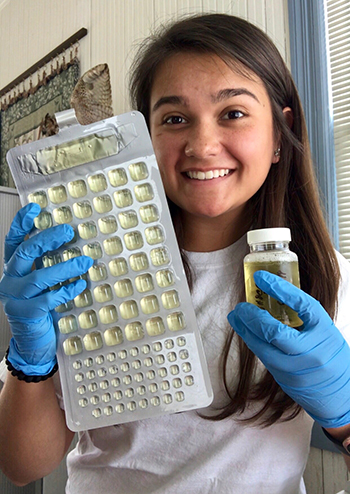
APRIL TURNER, CHAPEL HILL
April Turner is a University of North Carolina-Chapel Hill junior on a path to a medical degree. But the summer between her freshman and sophomore year, she became an environmentalist.
Courtesy of a Z. Smith Reynolds Foundation grant, the Greensboro native teamed up with Sound Rivers as an intern and got an introduction to the environment.
“It was an internship that piqued my interest, because when we think about health, we often neglect to think about the role the environment plays in health. I wanted to explore more of that connection of humans and the environment and vice versa,” April said.
That exploration came in variety of ways, from managing the Washington and New Bern offices to getting out in the field, taking water samples and testing for bacteria.
“What didn’t I learn?” April laughed. “For starters, I got to learn more about the environment and how we interact with the environment. I’d never really thought about, if there is fecal bacteria in the water, you don’t you have to ingest it; dermal interaction is enough (to affect health) … I learned to work with volunteers and read samples. I learned how to connect and engage with the community, for sure — especially with Swim Guide. I worked on translating everything to Spanish and increasing our outreach to the Spanish-speaking community.”
Of Colombian descent, April learned to speak Spanish as a child, but translating words associated with Sound Rivers’ work was a new experience.
“It’s something I want to use in my career, but prior to Sound Rivers, I never got to explore the language of environmental health,” she said.
A summer spent living in Greenville, working on the waterways of the Neuse and Tar-Pamlico river basins and taking advantage of opportunities to get out and interact with the natural world has had a lasting impact on the future doctor.
“The importance of the Sound Rivers is not only to improve the environment, but to teach the community about it. It’s made me much more conscientious: am I wasting water or using it efficiently? Am I doing what I can to clean up the waterways or the roads or am I adding to the problem? Sound Rivers tries to make people understand the ‘why’ of it, and when people understand the ‘why,’ that’s when they want to take part — that’s when they want to help protect this wonderful place we call home,” she said.
40 Stories, 40 Years: Bob Daw
March 20, 2023
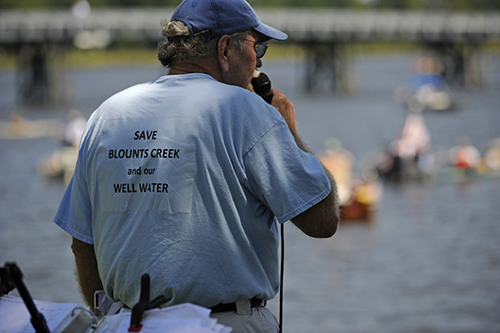
BOB DAW, BLOUNTS CREEK
Blounts Creek is home to Bob Daw. A Goldsboro native, Daw’s introduction to the creek came through his father. It had the best trout fishing, closest to home—much closer than the 120 miles they’d previously traveled to fish the Scuppernong River.
“Me and him spent a lot of good times down here fishing. If I weren’t working, if I got one night, I was down here in these cabins, fishing, playing guitars around the fire, getting to know these people here,” Daw said.
Daw spent his working life as a manufacturing manager for Cooper Standard, traveling all over the world, but Blounts Creek kept calling him back. He met his wife, Phyllis, there, and the couple had a particularly Blounts Creek wedding — they were actually married on a boat at the old Blounts Creek bridge, with a fleet of guests surrounding. And they were in the right place at the right time when property next to the old fishing camp cabins became available. It’s now their dream retirement home.
In 2011, when the first rumblings that a mine would be built in neighboring Vanceboro, and its millions of gallons of wastewater a day would potentially be dumped into the headwaters of the creek, Daw knew it had to be stopped.
He had history with Martin Marietta Mining.
“Fifty years ago, we would always go to Bachelor’s Creek to catch the big brim. But over the years — we didn’t know why — but you couldn’t catch nothing. The creek was so quiet, you couldn’t even find a snake there,” Daw said. “Then we found out about the mining. We didn’t know the name, we just heard that there was a big mining company, dumping all their wastewater in the creek. When I found out it was the same bunch, and knowing just how much it could damage the recreation and the fishing and the fun of people coming from all over to Blounts Creek, I was mad right out the gate — I said, ‘Let’s go get ‘em, let’s fight, let’s go.’”
Daw and a core group of Blounts Creek residents — including Cotton Patch Landing owner Jimmy Daniels, tour-boat Capt. Bob Boulden and retired schools’ superintendent Ed Rhine—launched “Save Blounts Creek” which became an advocacy and fundraising arm of Sound Rivers’ legal battle not to stop the 640-acre limestone pit mine from being built, but to find a better way to dispose of all the fresh water used in the mining process. Experts knew that much fresh water would irreparably harm the creek’s existing aquatic life, and there had to be a better way.
“I’ve always been passionate about Blounts Creek. I don’t remember if I’d already signed up or joined Sound Rivers before the ‘Save Blounts Creek’ campaign, but the awareness for me was that Sound Rivers was leading the charge to block Martin Marietta off and take them to court,” Daw said. “I’m sure that there was a lot of new memberships encouraged by the battle, and I’ve always tried to help out with things. I don’t have deep pockets, but Linda (Boyer) and I will play music for events, and just try to pass the word to donate. We raised a lot of money for that legal battle.”
Nearly a decade later, the case is still winding its way through the courts. There have been wins; there have been losses. Blounts Creek’s fate will be decided by the North Carolina Supreme Court, likely this year.
Daw remains passionate saving Blounts Creek — the source of many sunset cruises on his pontoon boat and fried fish dinners, where friends and family gather ‘round and evenings end with music played under the stars.
“I’ve got five granddaughters and three great-grandsons. They love Blounts Creek, they love to come down here. We’ve got four active eagles’ nests. We go around every year, and we count our osprey nests,” Daw said. “Saving Blounts Creek is for the future and enjoyment of so many people. With the citizens — unless we do create some kind of a shockwave, marches or boat rallies — it’s our only way to stop it, with the lawyers and attorneys and the courts. That’s the only way to deal with these people and, of course, Sound Rivers provided that resource. That’s why we rallied around and raised money to support Sound Rivers … I’m all about protecting the waters and supporting Sound Rivers.”
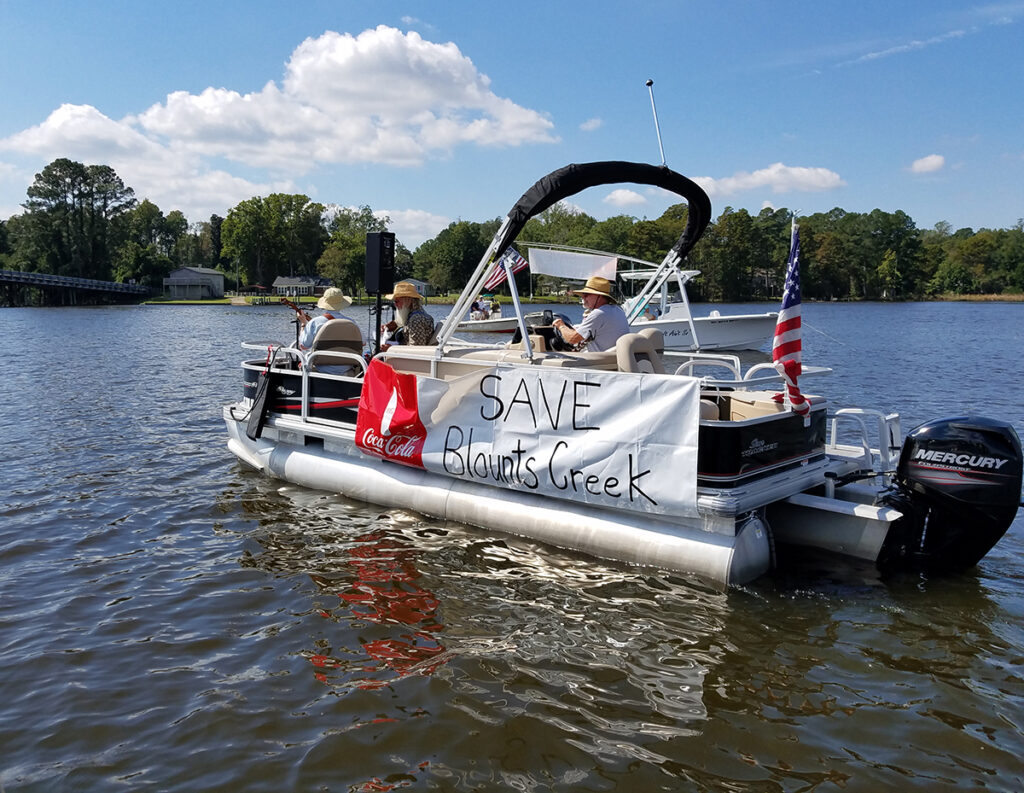
40 Stories, 40 Years: Joe Hester
March 20, 2023
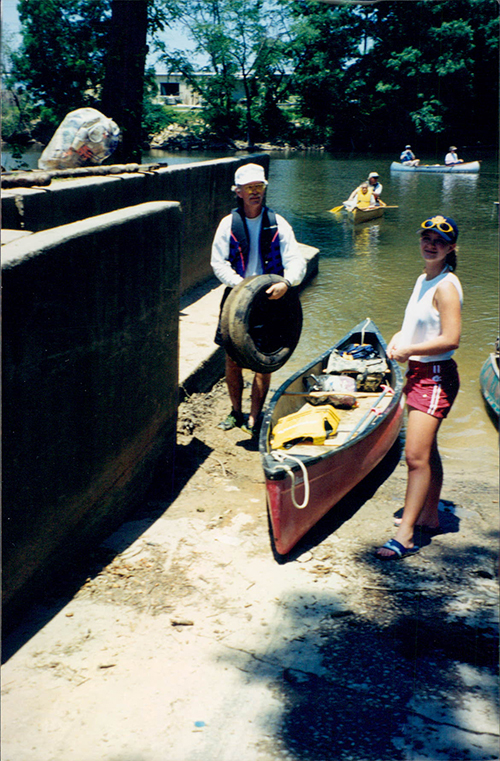
JOE HESTER, ROCKY MOUNT
“Most of our pJoe Hester doesn’t recall how he first became aware of the Pamlico-Tar River Foundation, now Sound Rivers. But the Rocky Mount attorney has been environmentalist for as long as he can remember.roblems for the river have always been, and now certainly are, from the land.”
“I was around for the first Earth Day, walking around the campus of UNC-Chapel Hill. I was around when they built the first nuclear facility in the state; I was there when they ditched and drained all the land in Dare County for farming,” Hester said.
Three decades later, he was at the helm of the Sound Rivers’ board when the decision was made to hire PTRF’s first riverkeeper, Heather Deck, now Sound Rivers’ executive director, though his involvement started long before — in the 1990s, when the river had reached a critical place.
“There was so much stuff going on that we were involved in,” Hester said. “PTRF was very involved; they coordinated, encouraged, mobilized state agencies to get Rocky Mount to upgrade its wastewater treatment plant — they had dumped 2 ½ billion gallons of raw sewage into the Tar (River), and it was terrible.”
Indeed, there were many things going on: PTRF was behind Swift and Sandy creeks being designated Outstanding Resource Waters, moving to protect “unique and special waters having exceptional water quality” and restricting types of development around them. Its members rallied around the “No OLF” movement, in which the U.S. Navy proposed building an outlying landing field in Beaufort and Washington counties that promised ecological devastation. PTRF had its hand in facilitating buy-outs of hog farms in the 100-year-flood plain after the historic flooding of Hurricane Floyd in 1999 and preventing a low-level radioactive waste dump from breaking ground in Edgecombe County, not to mention funding and grants to assist with the Albemarle-Pamlico Estuarine Study, Partnership for the Sounds, the North Carolina Estuarium — the only museum of its type in the world — the constructed wetlands on the Washington waterfront, and much more.
“The two people I think of when I think of PTRF are Dick Leach (a PTRF founder) and David McNaught (early executive director). We are where we are today, in my opinion, is because of them,” Hester said.
For his role in Rocky Mount city council ultimately nixing the construction by IBP of a hog-processing plant outside of Tarboro, Hester was given Sound Rivers’ Great Blue Heron award.
“We were involved; we went to hearings, but here’s why it was not approved: Sam Carlisle was my law partner, and he grew up in Tarboro. I found out that for IBP to exist, and to slaughter hogs 24 hours a day, seven days a week, it would have consumed 90- to 95-percent of all water designated for the growth of Rocky Mount. Sam knew everyone and went to talk to them, and that sank the IBP plan,” Hester said.
Hester said the role of PTRF then, and now of Sound Rivers, is to keep eyes on the ground, on the water — and on the data.
“One of the things I was also proud of was we came with facts. When we talked to a legislator, they knew we knew what we were talking about. We had the facts; we had the science. I was always proud that we were science-based,” he said. “It’s an organization that keeps its eyes out to protect the river. You have to be observant and cognizant of what’s going on in the watershed, and when you see what could be a deleterious effect — whether that’s an IBP or low-level radioactive waste dump — then you need to do the appropriate thing: provide the science to the decision-makers; mitigate; coordinate; when you can influence the rules, you try to do that. We’re for advocacy, we’re for education — yes — but we’re really for the watershed.”
Joe Hester and wife Betsy have been active Sound Rivers volunteers for more than 30 years, resulting in both the Hesters’ part-time residence in Washington, virtually next door to the site of Sound Rivers’ ever-popular Oyster Roast event, and Betsy now serving on the Sound Rivers board of directors.
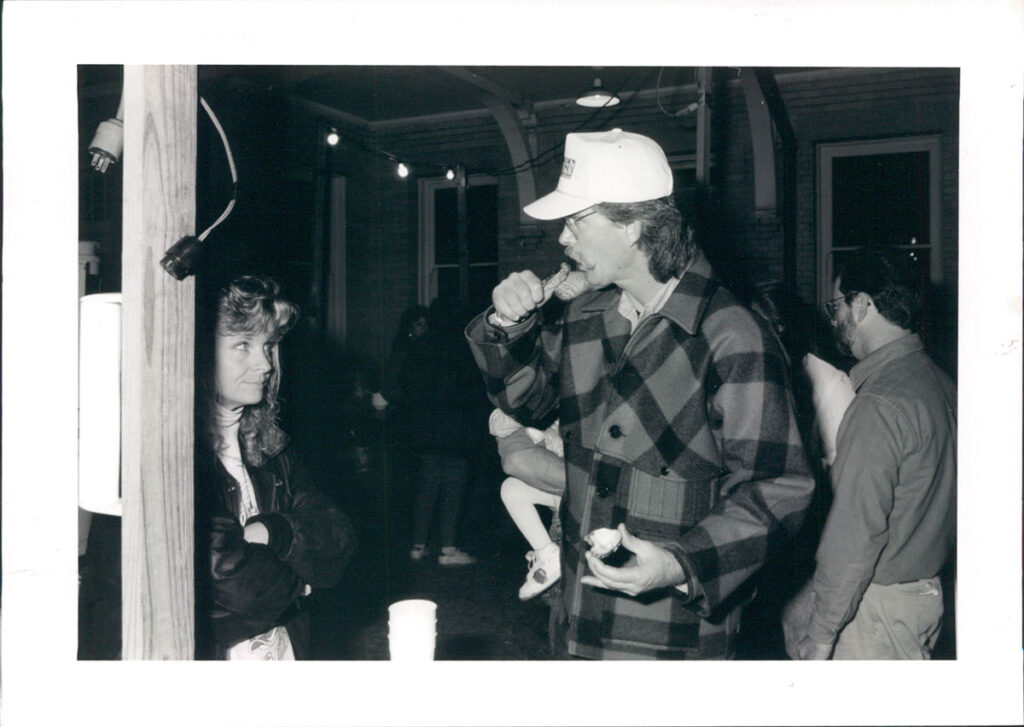
40 Stories, 40 Years: Eddie Smith
March 20, 2023
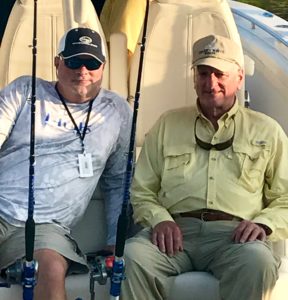
EDDIE SMITH, GRIMESLAND
When Eddie Smith moved to eastern North Carolina 53 years ago, he not only purchased a failed boat-manufacturing business, but he answered the call of the river.
“When I could sneak half a day off, I had a little 14-foot creek boat, and I would go down the Tar River to Chocowinity Bay. Back then, the sea grass went out 100 feet from the shore and was just filled with every type of marine life and any kind of fish you could find,” Smith said. “And I saw that start to decline.”
The owner of Grady White Boats was already involved with many conservation efforts — serving on national boards of organizations trying to protect water quality and preserve the natural environment for future generations — by the time the Pamlico-Tar River Foundation was founded in 1981. For Smith, PTRF’s mission aligned with his own, and that of the business he grew to become one of the most respected boatbuilding companies in the world.
“If you look at our company’s philanthropy, especially our foundation’s philanthropy, we do a pie chart of our areas of interest, and one of our biggest pieces of the pie is conservation,” Smith said. “It lines up, obviously very well, because if we don’t have healthy waterways, people are not going to want to recreate in or on them.”
In addition to supporting many organizations and projects through the years — Tar River Land Conservancy, Nature Conservancy, Coastal Land Trust, NC Coastal Federation, Coastal Conservation Association, Conservation Trust for NC, providing funding for land preservation, oyster and fish habitat restoration, and support for fundraising events — Smith joined the PTRF board early on. The early days were lean, he said.
“I would say for most of us, we had a direct tie to the Tar-Pamlico watershed. If you look back at the guys, in my mind, that did most of the heavy lifting — the Mr. Leaches and Dr. Larkins — they were passionate about it. We all had ties to the watershed and interest in it. We spent a lot time trying to figure it all out, as we were scratching to keep the lights on and pay the director,” Smith laughed.
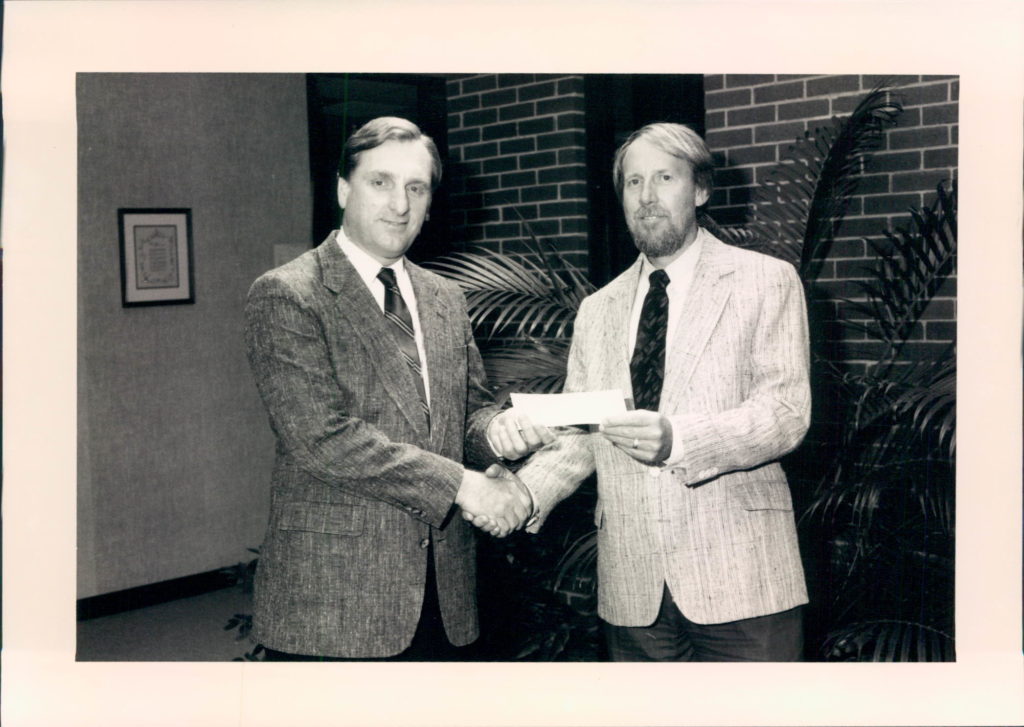
Keeping the lights on for one occasion meant Smith made a memorable donation: a ’57 Thunderbird raffled off as a fundraiser. The raffle netted PTRF more than $40,000 and made one ticket-holder a very happy classic-car owner.
The Smith family has continued its support for four decades: in 2015, son Chris served a pivotal role as a board member, guiding the merger of PTRF and Neuse River Foundation into Sound Rivers. After Hurricane Florence in 2018, the Eddie and Jo Allison Smith Family Foundation provided special funding for water-quality monitoring and flights to document impact, mapping inundated swine/poultry sites, river cleanups, a post-impact report and outreach and education regarding flooding, climate change and more.
And for the past four years, the foundation has supported Sound Rivers’ Swim Guide, which is the No. 1 reason why the water-quality notification program has been able to get off the ground and grow.
According to Smith, that’s what they do — and have done for decades.
“We tend to help the things that help the people of eastern North Carolina get started,” Smith said. “One of the things I’m proudest of is helping organizations that are protecting the waterways, protecting our resources. … People have no idea the value of the rivers and the sounds to North Carolina.”
40 Stories, 40 Years: Grace Evans
March 20, 2023
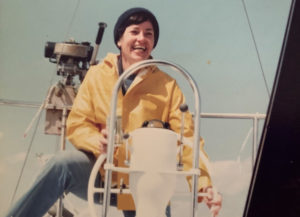
GRACE EVANS, ORIENTAL
“Most of our problems for the river have always been, and now certainly are, from the land.”
The words are those of Grace Evans, who, for more than last 40 years, was instrumental in the fight for clean water on the lower Neuse River. Grace passed away in 2021.
A lifelong sailor, the wide waters of the Neuse brought her to Oriental in the 1960s; by 1972, she decided to make the riverside town her permanent home and would go on to run two sailing schools.
“We swam, we didn’t get infections. We fished and floundered, just really enjoyed the river and didn’t think particularly of what it might contain. The river had plenty of fish and wonderful sailing,” Evans said.
But over time, the trash began piling up: creeks the dumping ground for household appliances; the river, a garbage receptacle for day-boaters. Then came the algal blooms and fish kills, and by 1980, when the Neuse River Foundation was founded, Evans was on board with its mission.
“Even though I made my living on the river, I also used it for my recreation. Every part of my life had to do with the river,” she said.
As an early member of the young environmental organization, Evans said she received an education on the urgent issues facing local waterways.
“It was just becoming aware myself of what was happening, and then making other people aware of it, too,” Evans said.
Those early members met in living rooms and in offices loaned for the occasion, before making the Neuse River Foundation’s first home in a trailer in Bridgeton. NRF petitioned the state to ban phosphates in cleaning products, the same phosphates that were throwing off the river’s natural balance, and won that battle. They built an army of creekkeepers — those who knew their waterways best — to keep tabs on polluting. Then, with a push from Evans, NRF made a pioneering step in honing its mission.
“We hired the first Riverkeeper in North Carolina, Rick Dove, and he was very effective. He was completely dedicated to the projects — nitrogen loading, animal farms, what the state was allowing different sewage treatments to do,” Evans said.
Late in life, Evans remained passionate about the work the Neuse River Foundation did, and that Sound Rivers continues today. Despite four decades of advocacy and education, she remained a firm believe that the work was far from over, than an ever-evolving array of issues continue to plague the waterways, from the sources of ongoing fish kills to sea-level rise and flooding.
“It used to be septic tanks, now it’s industrial farms,” Evans said. “What I’d like to see is much more awareness of what is happening on the land, and how what’s happening on the land affects the river.”
Water Quality Hacks at Home
March 9, 2023
Water Quality Hacks at Home
When it rains, it ultimately pours lots of bad stuff into our waterways. Stormwater runoff fills ditches, streams, creeks and rivers with pollutants such as pesticides, fertilizers, herbicides, motor oil from roads and driveways — you get the picture.
While it may same like a Herculean task to tackle water quality as a whole, it turns out everyone can play a part in reducing pollution stormwater runoff.
Here are a few good ways to make your own impact for clean water:
Lawn Care
If you’re planning to fertilize, test your soil to determine how much fertilizer you actually need. Apply fertilizers and pesticides sparingly, and do not apply before it’s supposed to rain. Compost your lawn clippings. Learn all you need to know about lawn care here!
Cut Your Pollution Contribution
There are some simple ways to cut back on polluting at home: reduce bacteria by picking up after your pets and disposing of the waste properly; wash your car on your lawn where the chemicals and soap can be absorbed and filtered by the soil instead of washing directly into a ditch or stream; maintain your septic tank — find out how here!
Gardening for Water Quality
When it comes to gardening and water quality, there are a variety of ways you can make an impact: planting/preserving trees and introducing rain gardens and rain barrels to your gardening repertoire. Rain gardens hold and slowly filter water, preventing runoff, while rain barrels and cisterns harvest rainwater to be reused. Find out more about how to install your own rain garden or install a rain barrel.
Learn other great tips and tools to reduce pollution with N.C. State Cooperative Extension’s A Gardener’s Guide to Protecting Water Quality.
And here are some more general ways you can address climate change by cutting back on your carbon footprint — individually, we can make a difference together will make a difference. If you have a tip to share, please email it to info@soundrivers.org.
- Reduce, Reuse and Recycle
Yep, that still works! - Use Water More Efficiently
Less water, less energy needed to pump to your home. - Commit to Eating More Plants and Less Meat
Livestock contribute 14.5% of global greenhouse emissions. Eat less meat and while you’re at it, choose locally sourced foods when possible and buying food with less packaging. - Install a smart thermometer to reduce energy use at home.
- Plant more trees and/or support groups that do.
- Vote!
Check out resources like vote411.org. - Be active in your community and find ways to support youth-led movements that focus on the environment.
40th Anniversary
March 9, 2023
40th Anniversary
40 years, fighting for clean water
2021 was a special year as Sound Rivers celebrated 40 years of fighting for clean water — your water.
In the fall of 2021, we premiered “A Sound River,” our 40th-anniversary film exploring Sound Rivers’ history of activism, from its humble beginnings around kitchen tables to court battles against industrial polluters, as told by the voices of Sound Rivers — its founders and partners, those continuing the fight for clean water and environmental justice, and the Riverkeepers guarding the waterways that cover nearly a quarter of North Carolina.
Rain Bennett, a Durham resident and Washington native, directed the film, drawing on Sound Rivers’ storytellers and experts to provide background and the science behind issues.
“Seeing and hearing some of the stories from the people who have been there from the beginning, it’s clear that certain things remain constant: there will always be industries and facilities and regulations and interests threatening our waterways, but there will also always be those who care deeply for the river and their community, ready to stand up to these challenges,” said former Pamlico-Tar Riverkeeper Jill Howell.
Watch the trailer for Sound Rivers today!
If you’re interested in hosting a watch party or screening the event, email us at info@soundrivers.org and we’ll be happy to make it happen.
